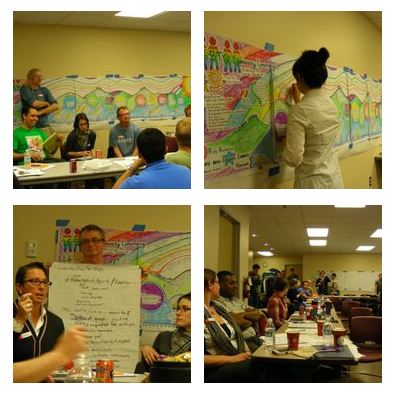After the One Anchorage Campaign loss in April, Pride Foundation and local partners from the ACLU of Alaska, Identity, Alaskans Together, and other interested community volunteers worked to bring together a diverse group of stakeholders from throughout the state to outline a forward-thinking vision for the LGBTQ movement in Alaska and identify preliminary next steps for moving us toward that vision. The hope was to build on the lessons learned, the coalition formed, and the momentum gained as a result of the campaign.
On Saturday November 17, we spent our day and evening with 30 people ranging in ages from early 20s to 70s from Bethel, Juneau, Fairbanks, and Anchorage who honestly (and sometimes uncomfortably) shared their histories, hopes, worries, and challenges with one another. As a result of the thoughtful planning, gifted facilitation by an outside consultant, and open engagement by the participants, the group left “hopeful”, “inspired”, and “grateful” for the opportunity to be a part of this process.
After spending some time sharing past lessons and analyzing the current social and political landscape, the convening group identified the following potential priorities for strengthening the movement for LGBTQ equality in Alaska:
Priority #1: Building the Base
While this convening was a good first step, the group recognized that it was only a first step toward building a strong base and coalition of allies to help advance the movement for equality. The people who define, advance, and communicate the goals of our movement should be as reflective of the diversity of our community as possible in terms of race, geography, and gender identity. It’s also important to engage and involve non-political LGBTQ groups rather than assuming their disinterest in conversations about advocacy. Furthermore, the group discussed the importance of identifying and cultivating relationships with allies in business, labor, healthcare, media, government, schools, and faith communities. Such partnerships help us create safe spaces and LGBTQ-inclusive policies. These groups are also part of efforts to which we might lend our time, energy, and skills that affect the entire community.
Priority #2: Document and Share the LGBTQ Experience—Past & Present
While there are a lot of anecdotal stories about the LGBTQ experience in Alaska, very little concrete research has been conducted regarding our population, our families, our professions, our voting and buying power, or what other Alaskans think about the LGBTQ community. This information could be used to make more informed decisions about how to advance the movement for LGBTQ equality in our state and how to share that vision with others. Furthermore, there are a lot of lessons to be learned from the history of pioneers, leaders, and activists throughout the state who have contributed to the movement thus far—their stories need to be documented, preserved, and shared.
Priority #3: Support and Engage LGBTQ Youth
There was a strong contingent of participants who were particularly interested in identifying and engaging community leaders from education, non-profit, church, and business sectors to support, engage, and champion LGBTQ youth and to provide youth with the skills to advocate and organize on their own behalf.
Priority #4: Explore Possibilities for a Statewide Organization or Coalition
Currently, Alaska lacks a single-state-based LGBTQ organization that has the ability to mobilize individuals throughout the state to advance the movement for equality whether it is focused on engaging the base, building partnerships, educating the public, or advocating for political change. Convening participants decided to create a working group to gauge whether a statewide entity was the best way to organize the LGBTQ community. This process of evaluation will include organizing town halls in multiple communities to test some of the ideas surfaced at the convening, and explore workable alternatives for building a statewide organization by either creating one from scratch, reviving, or merging existing organizations.
Priority #5: Healing the Base
The group acknowledged that the LGBTQ community is in deep need of healing from experiences of discrimination, political losses, internalized oppression, and interpersonal conflicts—all of which create barriers to accomplishing our goals and dilute the integrity of our message of equality. Participants discussed the need to create a system of mediation to address and prevent crises and to model for the rest of the community our vision of equality and inclusivity. This would be accomplished by establishing healthy group norms that include respect, transparency, assuming positive intent despite our differences, and speaking for and owning our individual perspectives while letting others speak from theirs.
While there might be a good bit of work to do in Alaska, there is a rich history of LGBTQ leadership and activism to build on—not to mention the “can-do” attitude it takes to thrive in Alaska. We look forward to continuing to work with the convening participants and all members of the community toward a vision of full equality for LGBTQ people in Alaska.
If you are interested in a particular priority/interest identified at the convening and would like to lend your time, skills, expertise, or feedback to this new phase of statewide movement-building, please contact Pride Foundation’s Regional Development Organizer in Alaska, Tiffany McClain: tiffany@pridefoundation.org or 907-903-1280.
